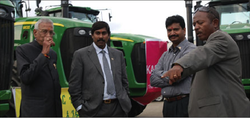CounterCurrents | 24 March 2011

By Duncan Green, Oxfam GB
One of the problems with so-called ‘land grabs’ is secrecy. Most of the contracts that seal such deals are hidden from public scrutiny, which makes it very hard to establish what is really going on. The International Institute for Environment and Development, which is rapidly becoming the ‘go to’ thinktank on a whole range of resource and development issues, has managed to dig up 12 such contracts and sent in the lawyers to have a look. The result is ‘Land deals in Africa: What is in the Contracts?’ Here’s what IIED found:
“A number of the contracts reviewed appear not to be fit for purpose: some are short, unspecific documents that grant enforceable, long-term rights to extensive areas of land, and in some cases priority rights over water, in exchange for little public revenue and apparently vague and potentially unenforceable promises of investment and/or jobs. Also, a number of the deals are being negotiated in legal contexts where safeguards for local interests are weak, and some contracts do not properly address social and environmental issues.
A few contracts feature better terms. A deal from Cameroon features higher and better distributed revenues, while a contract from Mali involves a sophisticated partnership with the host government and local farmers and applies international social and environmental standards. Three contracts from Liberia stand out for their more flexible duration, their clearer identification of the land being transacted, their more specific investor commitments on jobs, training, local procurement and local processing, their greater attention to local food security, and their tighter social and environmental safeguards. The Liberian contracts have been ratified by parliament and are available online.
In Liberia, determined political leadership, a strong government negotiating team, world-class legal assistance, effective use of financial analysis, and simultaneous (re)negotiation of agricultural and mining contracts (which led to productive cross-fertilisation) have made this outcome possible. Development agencies can play an important role in helping host governments access the capacity support they need.
But irrespective of contract terms, process is critical. In several of the contracts reviewed, local people appear to have been marginalised in decision-making – it is the government that usually calls the shots in contracting and land allocation procedures. So even in the better negotiated contracts, the gap between legality (whereby the government may formally own the land and freely allocate it to investors) and legitimacy (whereby local people feel the land they have used for generations is theirs) exposes local groups to the risk of dispossession and investors to that of contestation.
More generally, contracts are only part of the story. They only work if they are properly implemented. Wherever local rights are insecure or social and environmental safeguards are weak, there is a need for radical reform in national legislation, and for effective mechanisms to translate law reforms into real change. In this context, legal empowerment of local landholders is key. This means that people must have more secure rights to their land and greater control over decisions affecting it. It also means that legal rights alone are not enough – adequate capacity is needed to exercise them in practice, and collective action can help give real leverage to legal rights.
In addition, there is a need for inclusive debate in host countries. Much discussion about large-scale land acquisitions has so far been led by players and processes based in the global North. It is time for the people who are most directly concerned to have their say. The belief that large-scale plantations are needed to “modernise” agriculture is dominant in many government and investor circles, but there is no evidence to back it up. The literature suggests that many recent land-based investments are not economically viable, while family farmers have proved to be highly dynamic and competitive on global markets. It also shows that, where outside investment is required to improve productivity and livelihoods, productivity gains and commercial profitability can be achieved through working with local farmers.”
To see why this matters, read the Guardian’s John Vidal’s account of one such land grab in Ethiopia, by Bangalore-based food company Karuturi Global.
“It’s very good land. It’s quite cheap. In fact it is very cheap. We have no land like this in India,” says Karmjeet Sekhon, project manager for what is expected to be one of Africa’s largest farms. “There you are lucky to get 1% of organic matter in the soil. Here it is more than 5%. We don’t need fertiliser or herbicides. There is absolutely nothing that will not grow on it. To start with there will be 20,000 hectares of oil palm, 15,000 hectares of sugar cane and 40,000 hectares of rice, edible oils and maize and cotton. We are building reservoirs, dykes, roads, towns of 15,000 people. This is phase one. In three years time we will have 300,000 hectares cultivated and maybe 60,000 workers. We could feed a nation here.”
So does it create jobs or displace local farmers? Improve poor people’s food security or undermine it? Pay taxes or pocket a load of incentives? All depends what’s in the contract. John Vidal’s 11 minute video here.
Duncan Green, Head of Research for Oxfam GB and author of 'From Poverty to Power'. More information on Duncan and the book is available on the From Poverty to Power official website.













